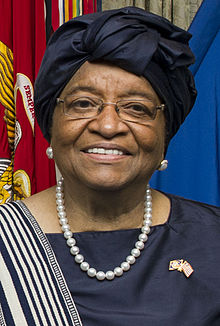Ellen Johnson Sirleaf | |
|---|---|
 Sirleaf in 2015 | |
| 24th President of Liberia | |
| In office 16 January 2006 – 22 January 2018 | |
| Vice President | Joseph Boakai |
| Preceded by | Gyude Bryant |
| Succeeded by | George Weah |
| Minister of Finance | |
| In office 1979 – 12 April 1980 | |
| President | William Tolbert |
| Preceded by | James T. Phillips Jr. |
| Succeeded by | Perry Zulu |
| In office 1990–1990[1] | |
| President | Amos Sawyer |
| Preceded by | Emmanuel Shaw |
| Succeeded by | Stephen Byron Tarr |
| Personal details | |
| Born | Ellen Eugenia Johnson 29 October 1938 Monrovia, Liberia |
| Political party |
|
| Spouse |
James Sirleaf
(m. 1956; div. 1961) |
| Children | 4 |
| Relatives | Retta (niece) |
| Education | |
| Awards | Nobel Peace Prize (2011) |
| Signature | |
Ellen Johnson Sirleaf (born Ellen Eugenia Johnson, 29 October 1938) is a Liberian politician who served as the 24th president of Liberia from 2006 to 2018. Sirleaf was the first elected female head of state in Africa.[2][3]
Sirleaf was born in Monrovia to a Gola father and Kru-German mother. She was educated at the College of West Africa. She completed her education in the United States, where she studied at Madison Business College, the University of Colorado Boulder, and Harvard University. She returned to Liberia to work in William Tolbert's government as Deputy Minister of Finance from 1971 to 1974. Later, she worked again in the West, for the World Bank in the Caribbean and Latin America. In 1979, she received a cabinet appointment as Minister of Finance, serving to 1980.
After Samuel Doe seized power in 1980 in a coup d'état and executed Tolbert, Sirleaf fled to the United States. She worked for Citibank and then the Equator Bank. She returned to Liberia to contest a senatorial seat for Montserrado County in 1985, an election that was disputed. She was arrested as a result of her open criticism of the military government in 1985 and was sentenced to ten years imprisonment, although she was later released.[4] Sirleaf continued to be involved in politics. She finished in second place at the 1997 presidential election, which was won by Charles Taylor.
She won the 2005 presidential election and took office on 16 January 2006. She was re-elected in 2011. She was the first woman in Africa elected as president of her country. She won the Nobel Peace Prize in 2011, in recognition of her efforts to bring women into the peacekeeping process. She has received numerous other awards for her leadership. In June 2016, Sirleaf was elected as the Chair of the Economic Community of West African States, making her the first woman to hold the position since it was created.[5]
- ^ Chiefs of State and Cabinet members of foreign governments / National Foreign Assessment Center. 1990Mar-Dec. 2003. hdl:2027/osu.32435083692814 – via HathiTrust.
- ^ "Johnson Sirleaf, Ellen Eugenia, (born 29 Oct. 1938), President of Liberia, since 2006", Who's Who, Oxford University Press, 1 December 2015, doi:10.1093/ww/9780199540884.013.u271942, retrieved 30 March 2022
- ^ Hough, Lory (10 September 2006). "Ellen Johnson Sirleaf: From HKS to the campaign trail". Harvard Kennedy School. Retrieved 7 September 2024.
- ^ "Ellen Johnson Sirleaf | Biography, Nobel Peace Prize, & Facts". Encyclopedia Britannica. Retrieved 20 May 2021.
- ^ "Liberia's President Ellen Sirleaf, Becomes First Female ECOWAS Chair". GhanaStar.com. 5 June 2016. Retrieved 5 June 2016.